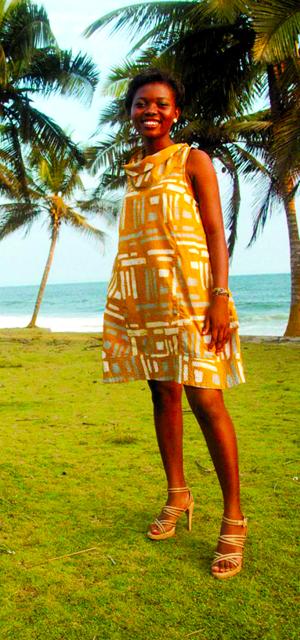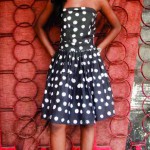- J Dress from Global Mamas, with boat neck, kimono sleeves and fitted skirt with tuck details.
- Sula dress from Mata Traders, block-printed fabric and hand-embroidery.
- Strapless dress from Global Mamas, 100 percent cotton, fitted at bust and waist.
- Strapless dress from Global Mamas, 100 percent cotton, fitted at bust and waist.
Mary Konsoon, an artisan from the West African Republic of Ghana, has a lofty goal — to get flush enough in her batik business that she can continue supporting extended family members while helping local children get a better education.
Konsoon specializes in the traditional craft of batik, a method of printing fabric dating back to 4th century Egypt that creates motifs with melted wax dipped in dye.
Handmade designs such as Konsoon’s will be featured at a fair trade fashion show and sale on Saturday, May 5, hosted by Ten Thousand Villages, a nonprofit organization with retail stores in downtown Asheville and Montreat, among other locales. The show coincides with World Fair Trade Day (which is actually more like Fair Trade couple-of-weeks, as it runs May 6-20, officially).
Living in a society as brimming with possibility as the U.S., it can be hard to imagine how Konsoon’s modest one-woman act could support several people and make a dent in her country’s educational system. But grassroots ambitions like hers have been increasingly realized in recent years, with support organizations such as Global Mamas, a not-for-profit group based in Ghana that joined forces with Konsoon when she most needed it.
The short version of Konsoon’s story goes like this. She worked at a supermarket for a year to save money for supplies to open a shop. Soon after she did, a sizable order for goods came in, but the client neglected to pay her for her work, she relates. The financial loss was crippling, so she turned to Global Mamas. With their resources, she was able to get back into business, hire two workers and an apprentice, and nearly double her income.
One of many Fair Trade organizations that have emerged over the last few decades, Global Mamas organized six producers in 2003 and now manages a network of over 600. The industry in general continues to expand its outreach in far-flung posts while gathering economic steam. According to the Fair Trade Resource Network, worldwide retail sales in 2010 passed $6 billion.
Fair Trade is based on a set of nine principles, among them: creating opportunities for marginalized producers, respecting cultural identity, paying fair wages, creating empowered working conditions and cultivating environmental stewardship. But how does this translate to money in the pockets of the folks making the goods?
“In my travels, I’ve learned that buying fair trade means you’re buying locally within that country with few middlemen. The workers get the money directly, then it trickles back into schools, markets and the community,” says Mandy Broderick, manager of Ten Thousand Villages’ College Street store. There, they sell handmade accessories and home décor from several countries including India, Pakistan and Peru.
Ten Thousand Villages began with Edna Ruth Byler, a traveler and Mennonite who was struck by the poverty she witnessed in Puerto Rico in 1946. She returned to America with handicrafts and sold them out of the trunk of her car. By 2006, sales through the company she founded had reached $20 million. Her vision, and that of the company, has been to create a decent living wage for producers, some of whom have additional personal obstacles to overcome.
“I’ve met about 20 of our artisans,” says Broderick. “About 80 percent are women. Many are disabled by tragedies such as land mines or polio. Fair Trade gives them the chance to make a dignified living.”
Fair Trade styles are increasingly fashion-forward, says Broderick, while continuing to preserve authentic cultural identity and artistic tradition.
From abroad, the Global Mamas’ producers and Mata Traders of India will be showcasing their styles.
Local businesses include JuJubee Clothing Co., The Open Door Boutique and Purls Yarn Emporium, all located in downtown Asheville. Small local nonprofits Beads & Seeds and SoleHope will contribute accessories. While most of the fashions are for women, there will be clothing for men and children as well. Other local businesses are participating by donating door prizes.
Last year the catwalk was set up in the back room at The LAB, but this year The Magnetic Field was chosen to accommodate a larger audience.
“In Asheville, we are known for our artistic community and often know the people behind the product,” Broderick says. “We just want to bring more awareness to fairly traded options. So Ten Thousand Villages networked with local businesses to showcase ethical fashions and highlight the importance of knowing where our clothes come from.”
what: Second Annual Fair Trade Fashion Show and Sale
where: The Magnetic Field, 372 Depot St.
when: Saturday, May 5 (2 to 4 p.m. $3/$5 suggested donation)








Before you comment
The comments section is here to provide a platform for civil dialogue on the issues we face together as a local community. Xpress is committed to offering this platform for all voices, but when the tone of the discussion gets nasty or strays off topic, we believe many people choose not to participate. Xpress editors are determined to moderate comments to ensure a constructive interchange is maintained. All comments judged not to be in keeping with the spirit of civil discourse will be removed and repeat violators will be banned. See here for our terms of service. Thank you for being part of this effort to promote respectful discussion.